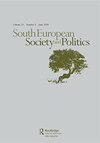Media Diet and Polarisation: Evidence from Spain
IF 4.6
1区 社会学
Q1 POLITICAL SCIENCE
引用次数: 3
Abstract
ABSTRACT Does media diet diversity influence affective polarisation of the public? To test this hypothesis we analyse data from Spain, which like other South European countries has a highly politicised media system. The study operationalises media diet diversity based on survey and web-tracking data. It considers diversity both in terms of the quantity of media consumed and exposure to opposing viewpoints using the two politico-ideological dimensions that conventionally define Spanish politics: left–right and centre–periphery. The results are rather complex and show certain ambivalence. As expected, a more diverse media diet generally tends to depolarise individuals; however, when considering the centre-periphery dimension, we find that media diet diversity can further exacerbate polarisation. That highlights the role identities can play as a potential source of polarisation.媒体饮食和两极分化:来自西班牙的证据
媒体饮食多样性是否影响公众的情感两极分化?为了验证这一假设,我们分析了来自西班牙的数据,西班牙和其他南欧国家一样,拥有高度政治化的媒体系统。该研究基于调查和网络跟踪数据来实现媒体饮食的多样性。它考虑了媒体消费数量和对立观点的多样性,使用传统上定义西班牙政治的两个政治意识形态维度:左右和中间边缘。结果相当复杂,并表现出一定的矛盾。正如预期的那样,更多样化的媒体饮食通常倾向于消除个人的两极化;然而,当考虑到中心-外围维度时,我们发现媒介饮食多样性会进一步加剧两极分化。这凸显了身份可能成为两极分化的潜在来源。
本文章由计算机程序翻译,如有差异,请以英文原文为准。
求助全文
约1分钟内获得全文
求助全文
来源期刊

South European Society and Politics
Multiple-
CiteScore
5.80
自引率
21.20%
发文量
14
期刊介绍:
A leading point of reference for scholars of Southern Europe, South European Society and Politics promotes both comparative and inter-disciplinary analyses, as well as offering innovative single county and sub-national studies. The journal acts as a forum for social, economic, cultural, contemporary historical and political approaches to research on the region, and is particularly keen to sponsor policy–focused studies in all these disciplines. The journal publishes research articles; South European Atlas with election reports and articles on other subjects of topical interest, and an extensive book reviews section, including both review articles and individual book reviews.
 求助内容:
求助内容: 应助结果提醒方式:
应助结果提醒方式:


